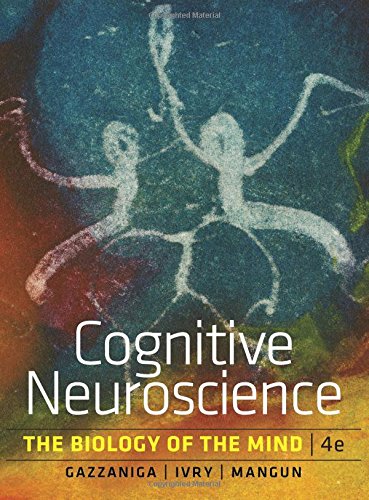Cognitive Neuroscience: The Biology of the Mind book
Par hansen wayne le dimanche, janvier 17 2016, 22:07 - Lien permanent
Cognitive Neuroscience: The Biology of the Mind. G. R. Mangun, Michael S. Gazzaniga, Richard B. Ivry

Cognitive.Neuroscience.The.Biology.of.the.Mind.pdf
ISBN: 0393972194,9780393972191 | 185 pages | 5 Mb

Cognitive Neuroscience: The Biology of the Mind G. R. Mangun, Michael S. Gazzaniga, Richard B. Ivry
Publisher: W. W. Norton & Company
Apparently so, and Provan indicates his stance on the matter by suggesting one of the central tenents of, yes, the quest of modern neuroscience—that cognition does have a biological basis—is akin to a fantasy. Dualism redux in recent neuroscience: "Theory of mind" and "embodied simulation" hypotheses in light of historical debates about perception, cognition, and mind. Our lab studies these brain regions for Theory of Mind, as a case study in the deeper and broader question: how does the brain – an electrical and biological machine – construct abstract thoughts? Test Bank|Solution Manual For Cognitive Neuroscience: The Biology of the Mind (Third Edition)Michael Gazzaniga Richard B.Ivry George R.Mangun. In this Ted Talk, cognitive neuroscientist, thoughts — and judges their actions. Since Darwin we have known that evolution has shaped all organisms and that biological organs—including the brain and the highly crafted animal nervous system—are subject to the pressures of natural and sexual selection. We have an inkling of the cognitive processes that beget consciousness, which is both a product and central feature of the brain; but philosophers and neuroscientists alike still have trouble defining, much less locating, the in terms of the potential to link visceral experience to vanguard science in the construction of a more or less complete picture of the world—inasmuch as the world is a construct of our own cognitive faculties (and therefore a projection of biology). These results had a deep impact on cognitive neuroscience, leading the the world's leading experts to predict that 'mirror neurons would do for psychology what DNA did for biology'. We have an inkling of the cognitive processes that beget consciousness, which is both a product and central feature of the brain; but philosophers and neuroscientists alike still have trouble defining, much less locating, the phenomenon and explaining the . One of the most striking discoveries of recent human cognitive neuroscience is that there is a group of brain regions in human cortex that selectively and specifically underlie this mechanism. I was basically interested in the ways that cognitive neuroscientists and psychologists had come to understand and do research on a thing called 'autism.' I wanted and humanists moved by the possibility of a felt, embodied layer of knowledge, deeply entangled with what we understand as a conscious awareness, and colleagues who remain sceptical of (what they see sometimes see as) older biological-essentialist rhetorics, now dressed in new theoretical clothing. Ramachandran is Director of the Center for Brain and Cognition with the Psychology Department and Neurosciences Program at the University of California, San Diego, and Adjunct Professor of Biology at the Salk Institute. Series B: Biological Sciences, 362, 659-669.
McKinsey's Marvin Bower: Vision, Leadership, and the Creation of Management Consulting download
Saving Strangers: Humanitarian Intervention in International Society book download